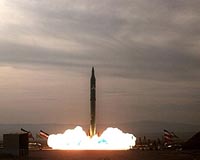| . |  |
. |
Copenhagen (AFP) Dec 18, 2009 Iran is ready to strike a uranium enrichment deal if the United States and the West respect the Islamic Republic and stop making threats, President Mahmoud Ahmadinejad told AFP Friday. "Everything is possible, 400 kilos, 800 kilos, it's nothing," for enrichment abroad, he said in a new gesture to try to end the nuclear standoff. "But not in a climate where they threaten us. They have to change their vocabulary, in respect and legality. "In this case we will say, very good you want to keep your word, in this case we are ready to sit down at the table to reach an agreement," Ahmadinejad said in an interview in the Danish capital. US President Barack Obama's administration has signalled that time is running out for Iran to seize an offer of diplomatic engagement for resolving the nuclear issues. The United States and the five other world powers trying to curb Iran's nuclear ambitions are expected to consult by telephone on December 22 amid threats of a fourth round of UN sanctions against Tehran. Washington has urged Iran to take up a UN proposal for Iran to send 2,645 pounds (1,200 kilograms) of its low enriched uranium to Russia "in one batch." Ahmadinejad said that 1,200 kilos '"is not such a large amount. We have the technology and we are currently producing this uranium (enriched) at 3.5 percent." "From the outset, delivering 1200 kilos of uranium was not a problem for us ... but they believe they can wave a stick to threaten us, those days are over," he said. "They are threatening us now, with sanctions, with resolutions, pressure, it's going backwards." The United States dismissed earlier this month an Iranian offer to swap 880 pounds of low-enriched uranium for nuclear fuel enriched to 20 percent in an exchange on the Gulf island of Kish, a free trade zone, as the first phase of a deal with world powers. The Iranian strongman repeated over and over in the 45-minute interview that "America and the others" -- referring also to Britain, China, France, Germany and Russia -- "must change (their) attitude and we will sit at the table to find an agreement." He called for "a middle way," but warned, "If they say again that they want to take out (low enriched uranium) to prevent Iran from making the bomb, it will be an insult. "If we want to make a bomb we would not be afraid of the United States ... but we do not want to make a bomb," Ahmadinejad said. "Our policy is transparent. If we wanted to make a bomb we would be brave enough to say so. When we say that we are not making one, we are not. We do not believe in it (the bomb)." Many in the West suspect Iran is developing technology to enrich uranium to highly refined levels to covertly build a nuclear bomb. Iran insists its nuclear programme is solely for civilian purposes and rejects Western suspicions that it is covertly trying to develop a bomb. The United States said Tuesday it will investigate a British newspaper report that Iran is working on a trigger for a nuclear bomb, adding the "revelation" fueled concerns about Iranian intentions. The Iranian foreign ministry dismissed The Times claim as a "scenario" hatched by Western powers. Share This Article With Planet Earth
Related Links Learn about nuclear weapons doctrine and defense at SpaceWar.com Learn about missile defense at SpaceWar.com All about missiles at SpaceWar.com Learn about the Superpowers of the 21st Century at SpaceWar.com
 Iran test-fires medium-range Sejil missile: state TV
Iran test-fires medium-range Sejil missile: state TVTehran (AFP) Dec 16, 2009 A defiant Iran on Wednesday test-fired an improved version of its Sejil 2 medium-range missile which it says can reach targets inside Israel, prompting a sharp rebuke from Britain. "It hit the defined target," state television reported, without giving further details. The two-stage Sejil, powered by solid fuel, is capable according to Iran of travelling 2,000 kilometres (1,240 miles) ... read more |
|
| The content herein, unless otherwise known to be public domain, are Copyright 1995-2009 - SpaceDaily. AFP and UPI Wire Stories are copyright Agence France-Presse and United Press International. ESA Portal Reports are copyright European Space Agency. All NASA sourced material is public domain. Additional copyrights may apply in whole or part to other bona fide parties. Advertising does not imply endorsement,agreement or approval of any opinions, statements or information provided by SpaceDaily on any Web page published or hosted by SpaceDaily. Privacy Statement |